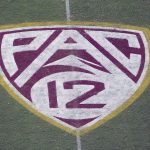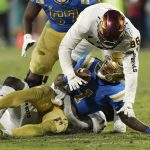For all the half-answers and complete unknowns presented Wednesday at the University of California Board of Regents meeting about UCLA’s planned departure for the Big Ten, one thing was perfectly clear: This isn’t over.
From UC system president Michael Drake describing the impact report as an “interim” document to regent John A. Perez noting that the meeting was “a really good start to the conversation,” the governing body of the UC indicated it plans a deep dive into all aspects of UCLA’s move, including its impact on Cal.
“I’m very concerned about the financial impact to Cal-Berkeley and to make sure whatever new revenue might be achieved” — by UCLA’s membership in the Big Ten — “envisions a scenario to help offset (Cal’s) need,” regent Tony Thurmond said.
The “financial impact” on Cal was one of many topics covered in a 17-page impact report discussed Wednesday by the regents. It laid out both the benefits and drawbacks of UCLA’s move to the Big Ten, along with USC, in the summer of 2024.
The Bruins’ exit from the Pac-12, announced June 30, was surprising in many regards, including the manner by which UCLA was able to leave behind its sister campus in Berkeley.
In response to an inquiry from the Hotline, a spokesperson from the UC Office of the President explained at the time that there was “no requirement for a decision from the University of California Board of Regents or the Office of the President.”
In other words, UCLA chancellor Gene Block had the authority to act on his own.
That might not be the case, after all.
“For this particular matter, the regents could say ‘We want to act and therefore we do not want the (UC) president or the (campus) chancellors to act in this area,’ and simply assert that,” Robinson said.
Another key exchange came moments later, when Perez, the former speaker of the California State Assembly — and a Cal graduate — asked Robinson about the mechanism required for withdrawing authority from a campus chancellor on matters of conference affiliation.
Couching the issue in hypothetical terms, Perez asked:
“Without noticing a meeting, without going to a meeting, between meetings, the board chair and the vice chair could act under interim action to retain an authority that had otherwise been delegated?”
“Correct,” Robinson said.
“These are two different questions,” Perez added moments later. “One question is what should happen to the delegation broadly going forward, which is a policy consideration.
“The second question is, mechanically, how does the board express its retention of a previously delegated authority. And so one way is through the interim action of the chair and the vice chair.
“What other ways could the board express that? … Because I don’t think we were clear on this until today. I’m trying to get clarity on what needs to happen for the board to express the retention of its authority in an item that has, by policy, been delegated.”
Robinson responded:
“The (UC) president is a direct report to the board chair, so one mechanism would be for the board chair to say, ‘I’m directing you, in this instance, to stand down, and the board will be exercising authority in this area.’”
The regents are scheduled to meet again Sept. 20-22 at UC San Diego.
Support the Hotline: Receive three months of unlimited access for just 99 cents. Yep, that’s 99 cents for 90 days, with the option to cancel anytime. Details are here, and thanks for your support.
*** Send suggestions, comments and tips (confidentiality guaranteed) to pac12hotline@bayareanewsgroup.com or call 408-920-5716
*** Follow me on Twitter: @WilnerHotline
*** Pac-12 Hotline is not endorsed or sponsored by the Pac-12 Conference, and the views expressed herein do not necessarily reflect the views of the Conference.
Related posts:

(AP Photo/Ralph Freso, File)
Wilner Hotline – Friday Pac-12 Mailbag
. (AP Photo/Mark J. Terrill)
Wilner Hotline: Ten Need-To-Knows For Pac-12 Week Six
(AP Photo/Ralph Freso, File)
Wilner – Pac-12 collapse: Tracing the 12 strategic blunders that led to Doomsday Hotline mailbag: Detailing the Pac-12’s liabilities, the ‘Pac-2’ and the MW, future of the NW rivalries, CFP rules, Bay Area regret and more
Hotline mailbag: Detailing the Pac-12’s liabilities, the ‘Pac-2’ and the MW, future of the NW rivalries, CFP rules, Bay Area regret and more
Jon Wilner
Jon Wilner has been covering college sports for decades and is an AP top-25 football and basketball voter as well as a Heisman Trophy voter. He was named Beat Writer of the Year in 2013 by the Football Writers Association of America for his coverage of the Pac-12, won first place for feature writing in 2016 in the Associated Press Sports Editors writing contest and is a five-time APSE honoree.
